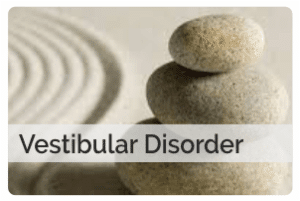
VESTIBULAR DISORDERS
The vestibular system plays major role in maintaining our balance and it includes part of inner ear and brain. Our body maintains balance with sensory information from three systems which are our vision, joints and muscles & inner ear. Input from these three systems is integrated and processed by the brain. Feedback is sent to the eyes to help maintain steady vision and to the muscles to help maintain posture and balance. Any injury, disease or ageing can affect one or more of these systems leading to vertigo & loss of balance and frequent falls. Sometimes, vestibular disorders can also be worsened by genetic, environmental/ weather and unknown reasons.
What are the signs and symptoms of Vestibular Disorder?
a. Dizziness
b. Recurrent falls
c. Fear of falling
d. Spinning
e. Difficulty in focussing during head movement
f. Headaches with imbalance
g. Clouded thinking
Also, Vestibular disorders are three times more common in elderly population and it does show gender discrepancy, 3 folds more common in females as compared to their male counterparts.
Vestibular disorder may affect your thinking ability, concentration, functional ability & self-confidence thus leading to social isolation and depression.
What are the common Vestibular Disorders that can result in vertigo/dizziness and poor balance?
a. Benign Paroxysmal Positional Vertigo
b. Meniere’s Disease
c. Vestibular Migraine
d. Vestibular Neuritis
e. Labyrinthitis
f. Otolithic Disorders
g. Perilymph Fistula
h. Acoustic Neuroma
i. Multiple Sclerosis
j. Mal de Debarquement Syndrome (MdDS)
k. Ototoxicity
l. Superior canal dehiscence
What is the AktivHealth’s approach to it?
At AktivHealth ‘” we have cutting edge technology which is accurate, non-invasive, reliable and affordable to diagnose vertigo and balance related disorders. Based on comprehensive functional evaluation of your central and peripheral equilibrium system, we deliver customized treatment plan with inputs from our medical team of doctors, physiotherapists and occupational therapists, all under one roof. Your vestibular rehab treatment may include one or more of the following:
a) Specific Vestibular Exercises
b) Balance re-training exercises
c) Repositioning maneuvere for BPPV
d) Supervised therapy sessions with the physiotherapist to monitor and continually challenge the vestibular, visual and balance systems.
This personalized rehab program enables the patient to resume their activities of daily life in the shortest possible time. Furthermore, we work with each patient, their family and friends, according to their abilities and mental attitude. We aim to improve the patient’s performance and help them reach their highest possible functional independence and minimize the risk of secondary complications such as falls and fractures.

